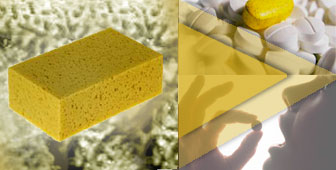Drug firms investigate new medicines from the sea

Sea sponges are not only handy in the bath. They could also provide doctors with a new generation of drugs to treat serious diseases, including cancer.
The idea of tapping natural chemicals in sponges and other marine creatures first absorbed the attention of researchers in the 1970s when the Swiss healthcare group Roche explored Australia’s Great Barrier Reef.
Now a quarter of a century on, the underwater treasure hunt is finally starting to yield results.
Some big pharmaceutical companies are examining marine anti-tumour products and are developing promising compounds.
The Swiss healthcare group, Novartis, for example, is studying a product called discodermolide derived from a Caribbean sponge. Researchers say it may prove to be many times more potent in killing cancer cells than Taxol, a chemotherapy for breast, ovarian and other cancers.
Poison harpoon
Meanwhile, Ireland’s Elan group plans to launch a new painkiller shortly that will be the first ever drug isolated from a marine organism, according to David Newman, a chemist in the natural products branch of the National Cancer Institute in the United States.
The compound, called Prialt, comes from a tropical cone snail which stabs its prey with a poisonous harpoon. It is designed to treat severe chronic pain in cancer and Aids patients.
The novel analgesic won conditional approval from the US Food and Drug Administration in 2000 and an Elan spokesman said the company hoped for final clearance later this year.
Behind it, the Spanish biotechnology company PharmaMar, a unit of Zeltia, set up specifically to comb the sea for drugs, expects to start selling its first anti-cancer compound, known by the codename ET-743, by the end of 2002 in Europe.
The drug, extracted from a grape-like sea squirt cultivated in the Mediterranean, is collected by divers, although a semi-synthetic version is also in development.
Zeltia has a further two cancer drugs in clinical trials, the most advanced of which – Aplidine – is showing promise.
Nature’s medicine chest
There is nothing particularly new about tapping nature’s medicine chest – the ancient Egyptians first recorded the use of medicinal plants about 4,000 years ago.
Modern medicine, too, has embraced a variety of natural products including the heart drug digitalis, originally made from foxglove; blood pressure treatments derived from viper venom; and a cancer medicine, Taxol, extracted from yew trees.
But it is only relatively recently that researchers have looked systematically to the sea -despite some chance discoveries that have helped in drug design. It was analysis of chemicals in Caribbean sponges in the 1950s, for example, which gave vital chemical clues needed to make the Aids drug AZT.
Newman, a world expert on drugs from the sea, believes there are good reasons to think marine invertebrates, particularly those found in tropical seas and on coral reefs, will yield powerful new drugs, including tumour-killing agents.
Chemical warfare
Sponges and other creatures are engaged in a chemical “arms race” in their watery environment, and they need potent defences to counteract the natural dilution of the sea.
“On a coral reef what you have is chemical warfare. Every invertebrate needs to have a toehold on the reef so it can feed and the way to defend that toehold is to develop a more powerful poison sack than the competition,” said Newman.
“That is why materials from the marine environment are normally extremely potent.”
Zeltia chairman Jose-Maria Fernandez Sousa-Faro says his company has collected 22,000 marine samples since 1986 and he is confident there are many more new drugs among them.
“Many of the medicines currently on the market originally came from natural sources – but terrestrial ones. Nobody has yet searched systematically in the oceans and there is a big opportunity there since they contain 75 percent of the world’s living species,” he said.
“There is no reason to think that the sea cannot provide us with as good medicine as the land has done before.”
Anti-tumour products
Modern techniques for analysing chemicals found in marine organisms are helping in the hunt and big pharmaceutical companies are starting to pay attention.
Zeltia in August signed Europe’s second biggest biotech marketing deal ever for its cancer drug ET-743 with U.S. healthcare giant Johnson & Johnson, worth more than $100 million.
Outside the cancer field, scientists from the University of Mississippi announced earlier this year that several Pacific sponges produced alkaloids that could help fight malaria, tuberculosis and other infectious diseases.
swissinfo with agencies

In compliance with the JTI standards
More: SWI swissinfo.ch certified by the Journalism Trust Initiative
You can find an overview of ongoing debates with our journalists here. Please join us!
If you want to start a conversation about a topic raised in this article or want to report factual errors, email us at english@swissinfo.ch.